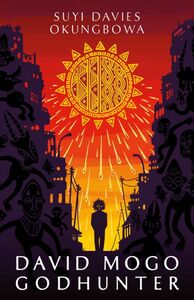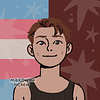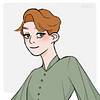Take a photo of a barcode or cover
2.5 Stars
This book had so much potential. Gods have fallen in Lagos and everything has gone to shits. David Mogo, demi-god, is a godhunter. Woven with Nigerian mythology and legends, we see various gods and battles take place. And David finds trying to get Lagos back to normal isn't easy.
The mythology behind the book is what really makes it stand out -the various gods, pantheons, and tales that come along with them. Imagine Rick Riordan but Nigerian tales. There's the same humour and electricity that flows within this book.
However, there's a lot of telling and explaining. Instead of being guided and shown through scenes, we are told in a quick and snappy manner. Anything that needs to be revealed is told through David's monologue. Had this been otherwise, my rating would have been much higher. With this, there was also a lack of foreshadowing that leads to the plot twists and reveals. Rather than planting seeds and eggs throughout the novel, we are just told when it comes to the time.
My other issue relies on the fact that David gets knocked out a lot. It seems as soon as battles, or a scene starts to become interesting he gets knocked out. In the end, every other chapter feels as if it's ending with him passed out in one form or another. Especially the bigger battles, the ones where it's life or death, it feels like he just passes out and then we're told what we actually missed.
This book had so much potential. Gods have fallen in Lagos and everything has gone to shits. David Mogo, demi-god, is a godhunter. Woven with Nigerian mythology and legends, we see various gods and battles take place. And David finds trying to get Lagos back to normal isn't easy.
The mythology behind the book is what really makes it stand out -the various gods, pantheons, and tales that come along with them. Imagine Rick Riordan but Nigerian tales. There's the same humour and electricity that flows within this book.
However, there's a lot of telling and explaining. Instead of being guided and shown through scenes, we are told in a quick and snappy manner. Anything that needs to be revealed is told through David's monologue. Had this been otherwise, my rating would have been much higher. With this, there was also a lack of foreshadowing that leads to the plot twists and reveals. Rather than planting seeds and eggs throughout the novel, we are just told when it comes to the time.
My other issue relies on the fact that David gets knocked out a lot. It seems as soon as battles, or a scene starts to become interesting he gets knocked out. In the end, every other chapter feels as if it's ending with him passed out in one form or another. Especially the bigger battles, the ones where it's life or death, it feels like he just passes out and then we're told what we actually missed.
adventurous
dark
medium-paced
Strong character development:
Complicated
Loveable characters:
Complicated
Diverse cast of characters:
Yes
Flaws of characters a main focus:
Yes
like it says in the tin: “Nigerian Harry Dresden”. the stories feel so very human, and relatable, even while being both fantastical, and unfamiliar. the use of dialect is wonderful and challenging, i look forward to more from this author.
adventurous
emotional
medium-paced
Strong character development:
Yes
Loveable characters:
Yes
Diverse cast of characters:
Yes
Flaws of characters a main focus:
Yes
adventurous
tense
fast-paced
Strong character development:
Complicated
Loveable characters:
No
Diverse cast of characters:
Yes
Flaws of characters a main focus:
Yes
I wanted to like this far more than I did. A Nigerian post-godpocalyptic urban fantasy sounds epic - and it is - but the structure of interlinked novellas left me dissatisfied, as I felt the characters played second fiddle to the action. It is worth a look though - warring pantheons vs a demi-god discovering his true nature make for great conflicts in a half-ruined Lagos clinging bravely on in the face of forces it cannot resist. Okungbowa is definitely one to watch.
Back cover calls it ”a Nigerian Harry Dresden," which, ouch.
I like the setting, but the plot and the characters are decidedly snooze-worthy.
I received an ARC from NetGalley in exchange for an honest review.
DNF'd @ 35%
The concept of this book absolutely reeled me in from the get go. Unfortunately though the actual execution of the story didn't work for me. There's way too much tell and infodumps that it bogs everything and loses its forward momentum - and my interest. Thanks anyway, NetGalley.
DNF'd @ 35%
The concept of this book absolutely reeled me in from the get go. Unfortunately though the actual execution of the story didn't work for me. There's way too much tell and infodumps that it bogs everything and loses its forward momentum - and my interest. Thanks anyway, NetGalley.
Trigger Warnings Implied predator / Implied torture / 'Curing' of Speech-Impaired Character
David Mogo, Godhunter is an interesting own voices fantasy novel set in our world, that with a bit of extra attention could have been great. Instead it flies just short of falling flat.
I was quite honestly very excited for this book. I mean it is an own voices book when it comes down to the culture. Lagos, Nigeria is where the author comes from and just that alone is something that sets this book apart. Another thing that I think will appeal to a lot of people is that there is basically no romance in here.
But the book didn’t quite build up as I expected it to be. Essentially this book is set up in 3 parts that felt more like 3 novella’s due to the time jumps and arcs between them. Especially between part 1 and 2 which was six months. It meant that each part had to wrap its ‘arc’ up action and plot wise. It left not as much room for world building as I would have liked to have seen. In the first part there was room to capture the feel of Lagos and how the Falling (the big event that happened before the book starts) affected the city. It made this first part so much more appealing to me.
Part 2 and part 3 were more focused on a bigger plot and the journey to finding oneself in being a demigod. Set between humans and gods. There was less room for world building and the things that I thought would be expanded on. More on the Gods, the Island and Odon, got left behind. That could have been okay had the journey to finding oneself not been as boring and unnecessary. Or some scenes were in any case like a scene where he got called out for showing his anger once and all of sudden he was losing credibility with everyone. Just things like that, that didn’t make sense in the grand scheme of what the author seemed to want to do here.
It is written in a first person present point of view. Again the first part, David’s voice was incredibly strong. I liked him. But I felt we lost a lot in the second and third part. I feel like we lost a lot to him repeating himself. Even so I did still like him for the most part. I also liked his relationship with his adopted father. An interesting thing here is code-switching which is switching between two or more languages within one conversation which is what happened often in speaking between these two. However it took some getting used to as it isn’t quite so easy to figure out what they are saying. Sometimes I don’t think I actually caught the meaning.
Another character I found interesting was Fati, a teenage girl David rescues from an adult wizard meaning to marry her. She comes to live with him and his adopted father. She is speech-impaired. I wish there had been more room for her personality to expand. Much of her time on the page is spend with others talking (who inhabit her at some point) and not so much coming from herself. I also dislike that at the end she was ‘cured’.
Having said that, if you are looking for an African fantasy and are prepared to go into this novella set up I think one can really enjoy this. I think this author does have some great ideas and I can’t wait to see what he will come up with in the future.
David Mogo, Godhunter is an interesting own voices fantasy novel set in our world, that with a bit of extra attention could have been great. Instead it flies just short of falling flat.
I was quite honestly very excited for this book. I mean it is an own voices book when it comes down to the culture. Lagos, Nigeria is where the author comes from and just that alone is something that sets this book apart. Another thing that I think will appeal to a lot of people is that there is basically no romance in here.
But the book didn’t quite build up as I expected it to be. Essentially this book is set up in 3 parts that felt more like 3 novella’s due to the time jumps and arcs between them. Especially between part 1 and 2 which was six months. It meant that each part had to wrap its ‘arc’ up action and plot wise. It left not as much room for world building as I would have liked to have seen. In the first part there was room to capture the feel of Lagos and how the Falling (the big event that happened before the book starts) affected the city. It made this first part so much more appealing to me.
Part 2 and part 3 were more focused on a bigger plot and the journey to finding oneself in being a demigod. Set between humans and gods. There was less room for world building and the things that I thought would be expanded on. More on the Gods, the Island and Odon, got left behind. That could have been okay had the journey to finding oneself not been as boring and unnecessary. Or some scenes were in any case like a scene where he got called out for showing his anger once and all of sudden he was losing credibility with everyone. Just things like that, that didn’t make sense in the grand scheme of what the author seemed to want to do here.
It is written in a first person present point of view. Again the first part, David’s voice was incredibly strong. I liked him. But I felt we lost a lot in the second and third part. I feel like we lost a lot to him repeating himself. Even so I did still like him for the most part. I also liked his relationship with his adopted father. An interesting thing here is code-switching which is switching between two or more languages within one conversation which is what happened often in speaking between these two. However it took some getting used to as it isn’t quite so easy to figure out what they are saying. Sometimes I don’t think I actually caught the meaning.
Another character I found interesting was Fati, a teenage girl David rescues from an adult wizard meaning to marry her. She comes to live with him and his adopted father. She is speech-impaired. I wish there had been more room for her personality to expand. Much of her time on the page is spend with others talking (who inhabit her at some point) and not so much coming from herself. I also dislike that at the end she was ‘cured’.
Having said that, if you are looking for an African fantasy and are prepared to go into this novella set up I think one can really enjoy this. I think this author does have some great ideas and I can’t wait to see what he will come up with in the future.
This was one of those books which sadly promised a little more than it was able to deliver in the end - the main issue I had with it was that, while it was an interesting premise and well-written, it got bogged down in unnecessary amounts of exposition and felt as though it was a novella-length plot dragged out to novel-length.
The basic idea of the book is that it's set in Lagos, Nigeria at a time after a number of gods have come to the place, understandably causing chaos. Our protagonist, the eponymous David Mogo, makes a living dealing with the minor gods and makes an unsavoury deal at the beginning of the book to capture a pair of twin gods. In the end, he's only able to catch one of them and then starts to realise that he's been played for a sucker and that his erstwhile employer is actually trying to accumulate power by using the gods he wants David to deliver to him.
Our hero is, of course, something special too - half god, through his mother's side, and raised by a magician to use the powers he's inherited. As the book goes on, David comes into his inheritance more and more, as well as allying himself with a number of others (both gods and mortals) in order to deal with the risks to the people of Lagos.
There's no disputing the author knows how to spin a story, keeping my attention despite the amount of monologuing the villains get up to. I can see why the publishers picked this book up but a stronger editor might have made for a better book in the long run, as well as taking the many interesting ideas laid out here and making them into something more robust.
I received an advance copy of this book from the publisher via Netgalley in exchange for an honest review.
The basic idea of the book is that it's set in Lagos, Nigeria at a time after a number of gods have come to the place, understandably causing chaos. Our protagonist, the eponymous David Mogo, makes a living dealing with the minor gods and makes an unsavoury deal at the beginning of the book to capture a pair of twin gods. In the end, he's only able to catch one of them and then starts to realise that he's been played for a sucker and that his erstwhile employer is actually trying to accumulate power by using the gods he wants David to deliver to him.
Our hero is, of course, something special too - half god, through his mother's side, and raised by a magician to use the powers he's inherited. As the book goes on, David comes into his inheritance more and more, as well as allying himself with a number of others (both gods and mortals) in order to deal with the risks to the people of Lagos.
There's no disputing the author knows how to spin a story, keeping my attention despite the amount of monologuing the villains get up to. I can see why the publishers picked this book up but a stronger editor might have made for a better book in the long run, as well as taking the many interesting ideas laid out here and making them into something more robust.







